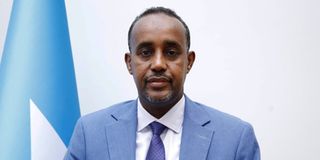Somalia PM assures free, fair elections after politicians raise concerns

Mohamed Hussein Roble, Somalia's new prime minister.
What you need to know:
- He said the new teams were encouraged to ensure fairness as it will sustain Somalia’s trajectory from years of violence and instability.
- Somalia initially planned for universal suffrage but challenges to do with security and what the PM said were prevailing political circumstances made it difficult to implement this.
Somalia Prime Minister Mohamed Hussein Roble has assured a free and fair election after concerns were raised about the political standing of key electoral teams.
Mr Roble, who is about two months into his job, met in Mogadishu with members of election committees to discuss the upcoming national poll and its importance to the country’s progress and development.
He said the new teams were encouraged to ensure fairness as it will sustain Somalia’s trajectory from years of violence and instability.
That responsibility, he said on Thursday, lies in the hands of the new electoral teams.
The teams - the National Election Committee (NEC) and the Conflict Resolution Committee (CRC) - were appointed just a fortnight ago.
Some politicians say they include civil servants who could help with rigging the elections.
Addressing the issue of election transparency, fairness and security with the election committees, which included representatives of the majority of the federal member states, Mr Roble said the government is keen on ensuring fairness.
“The election must deliver on the democratic hopes and aspirations of the Somali people,” he told the meeting.

Some of the Somalia electoral committee members who met with Prime Minister Mohamed Hussein Roble on November 19, 2020.
Inclusive politics
Somalia initially planned for universal suffrage but challenges to do with security and what the PM said were prevailing political circumstances made it difficult to implement this.
Instead, the federal government and federal states agreed on an enhanced indirect election.
The polls begin next month when specially selected delegates will choose 54 senators and 275 MPs of the Lower House, who will in turn elect the federal president in a joint session with the 54 members of the Upper House.
The premier reminded the committees of the importance of the elections on the advancement of inclusive politics, including the 30 per cent women’s quota, economic development and social solidarity in Somalia.
Coincidently, Somalia’s international partners, including the African Union, European Union, United Nations, Igad, Amisom and a host of countries, issued a joint statement on Thursday on implementation of the National Electoral Process.
“We encourage sustained dialogue within the framework of the National Consultative Council and with other key stakeholders to keep the electoral process on track and inclusive,” they said.
“We call on FGS and FMS leaders, the electoral management bodies, clan elders and the civil society to take all necessary steps to ensure at least 30 per cent of MPs and senators from each community are women and that the elections are held in a timely manner.”





